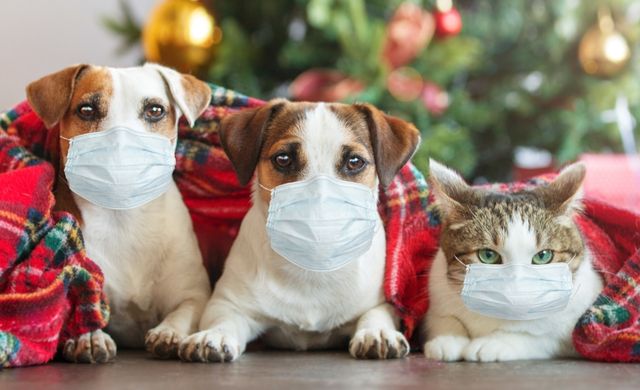
Your Dogs and Cats Can Face Post-Pandemic Adjustments
10/04/2022 06:00AM | 1859 viewsWhen the pandemic hit, did you suddenly find yourself in a house full of people all day every day, everyone working and learning from home?
Or maybe you were an essential worker, doing your best to do your job while dealing with high levels of uncertainty.
Nearly every person faced an abrupt disruption of their routines.
The same is true for your pets.
And now that we’re all adjusting yet again (and again) – back and forth between levels of restrictions, as Covid variants wax and wane – it’s good to be aware of how this may impact your pets.
A Surge in Pet Adoptions During the Pandemic
Nearly one in five U.S. households acquired a cat or dog during the pandemic, according to the ASPCA (The American Society for the Prevention of Cruelty to Animals).
Banfield Pet Hospital had roughly half a million more pet visits in 2020 than the year prior. As the nation's largest provider of preventive veterinary medicine (with 1,000+ hospitals and nearly 20,000 associates in neighborhoods across the country), Banfield’s numbers give us a good idea of trends across the country.
Dr. Mary Guerra is a veterinarian with Banfield Pet Hospital. As vice president of Banfield’s Northern California region, she oversees hospitals in the area. She said they’ve been getting a lot of questions from people who adopted pets during the pandemic and also from long-time pet parents – people trying to help their pets adjust to the changes in daily routines.
“We love it when people ask us questions,” said Dr. Guerra. “Always feel free to ask your veterinarian anything. Our pets can’t tell us what’s going on, so it’s good to be curious and to proactively look for clues.”
Banfield’s data gives us an idea of what those clues might be. Based on an analysis of health records from the millions of pets seen at Banfield each year, among key findings for 2020 was a dramatic surge in itchy, barfy, anxious, overweight pets when compared to 2019, with a 58.7% increase in skin allergies, 11.4% increase in visits related to vomiting, a 25% increase in fear/anxiety, and 24% more pet owners saying their pet gained weight compared to just five months prior.
Banfield also found that owners were more committed than ever to getting their pet to the vet during that time. Visits increased 20.4% for kittens and 14.3% for puppies in 2020.
Whether your pet is a new addition or a long-time member of your family, he or she faces adjustments just like you do:
- Adjusting to disrupted routines
- Dealing with continued or new stressors
- Needing to catch up on preventive care
Adjusting to Disrupted Routines
Just like humans, our pets like their routines. And for the past few years, those routines have probably changed. Pets have become accustomed to a level of family time that probably won’t be realistic now that we’re shifting back to in-person school, work and social lives.
Some pets, like people, lived through the first adjustment – suddenly the house was full all day.
Everyone’s home, yay!
Now, they have to adjust again. Or, they were born during the pandemic and don’t know life any other way.
Where’d everybody go?
“We’re seeing a lot of pets that have never been left at home by themselves for such long stretches,” said Dr. Guerra. “There are some things you can do to set them up for success.”
She suggests easing into the change by leaving them for short periods of time. This will help them get used to being home alone, and it will give you a chance to try different ways of setting up the home environment so they feel safe and secure. For example, some dogs enjoy having the television on, while others don’t.
“It’s about finding some new structure in their home life. Just like we’re getting our own human lives into back into gear, pets are also trying to restructure their lives, too.”
There are devices that can help. Having cameras at home can help you monitor and see what’s happening while you’re away. For her own dog, Dr. Guerra uses a product called Whistle, a device that tracks and translates activity, behavior, location, wellness and more. (Whistle, like Banfield, is owned by Mars, Inc.)
“I live in constant fear that I’ll lose my baby chihuahua. If she leaves the safety zone I get a notice. It also monitors her health and gives parameters to look at. It’s so helpful, because our pets can’t tell us what’s going on.”
Dealing with Continued or New Anxieties
Pets can experience anxiety just like we do. Dr. Guerra shared some ideas about what to look for to know if your pet is having a hard time adjusting:
- Seemingly small changes to their behavior. If they’re just a little off, they’re not eating as much, crying when you leave – any behavior that’s out of the ordinary.
- More destruction where there wasn’t destruction before. For example, a door that suddenly has scratch marks.
- Behaviors that lead to wounds or injuries. This might include compulsive licking, which might lead to hair loss, sores or rashes.
If you see any of these, have a conversation with your veterinarian.
“You know your pet best, so take note of even little changes,” said Dr. Guerra. “That’s when you want to have a good conversation with a veterinarian. You want to be able to rule out medical issues.”
This is also a great reason to make sure you’re keeping up with preventive care, because that gives you a baseline to compare to. As Dr. Guerra said: “This is why it is important to for your pet to have a twice-a-year exam by your veterinarian.”
Needing to Catch Up On Preventive Care – Especially Parasite Control
Dr. Guerra emphasized the importance of parasite control. Some of these measures might have fallen by the wayside during the pandemic, while we were all inside much of the time.
“But now we’re back at the park, and taking pets out more,” she said. “They need the protection of consistent, comprehensive parasite control. This is one of the most important things you can do, because it protects your pets and it also protects your family.”
Dr. Guerra said there are tick-borne diseases that can impact animals and humans. Your family members can contract some of these parasites and the diseases they cause. Keeping your pet’s flea, tick and heartworm prevention up to date helps reduce the likelihood of disease.
Some people assume they don’t need this control based on where they live. But Dr. Guerra said that’s not true. Always assume your pet needs protection.
Once again, if you’re not sure, have a conversation with your veterinarian.
“I really want to emphasize the importance of asking questions and being in conversation with your veterinarian. That’s what we’re here for. We love to help.”
Your pets are part of your family, and you’re all emerging from the pandemic together.






Post your Comment
Please login or sign up to comment
Comments